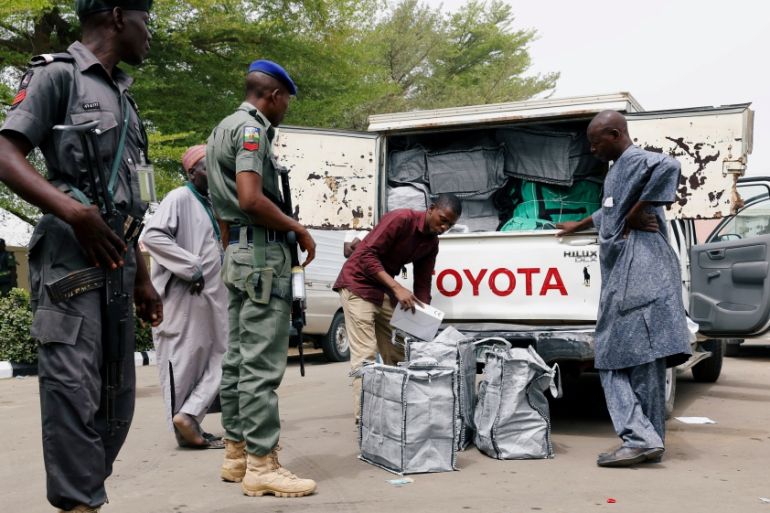Nigerians lament election delays – and the costs
Nigerians say vote postponement has hit them financially and forced some to change well-laid plans.

Abuja, Nigeria – Okiti Erhovwo, a physiologist and relationship coach, planned his wedding for March 9 after considering the scheduled dates of the general elections.
The presidential and legislative elections were to take place on February 16 and the state governorship on March 2.
Keep reading
list of 4 itemsFull jury panel seated on third day of Trump’s New York hush-money trial
Jacob Zuma’s nine lives: How South Africa’s ex-president keeps coming back
A flash flood and a quiet sale highlight India’s Sikkim’s hydro problems
But the postponement announced on Saturday of the governorship election to March 9 has forced him to cancel his marriage ceremony.
“It’s disheartening, to say, the least that after making preparations and putting logistics in a place for our wedding … elections have been postponed to the same wedding date. It’s devastating. So sad,” Erhovwo told Al Jazeera.
Besides dealing with the disappointment, he now has to make new arrangements to marry his fiance, Eminence Agbechoma, who took the announcement even harder.
“There’s no one that would be excited at such sudden news. She felt sad, the family felt sad. But our hope is that God will do that which he, God, has set out to do and he that started this good work would surely complete it,” Erhovwo said.
Economic impact
|
|
The Independent National Electoral Commission (INEC) announced the postponement of polls early Saturday following an emergency meeting in the capital, Abuja.
INEC said it needed more time to ensure a free and fair vote.
Many Nigerians who stayed up late to follow proceedings were angered by the decision.
Social media has become a platform to complain about the economic implications of the vote delay by a week.
Voters can only cast their ballots in places where they are registered by INEC, or they must seek a transfer to their preferred voting centres.
Some Nigerians travelled hundreds of kilometres to vote and the postponement – just a few hours prior to the opening of the polls – has left some stranded.
Despite the inconvenience, some Nigerians are willing to pay the travel costs again.
|
|
“For us, this election is very crucial and people want to demonstrate their faith in democracy by participating in deciding their future,” businessman Pascal Metuh told Al Jazeera.
Some businesses and offices are still shut.
“This is a loss of business to the economy, which is not good news for economic performance,” economist Aliyu Audu told Al Jazeera.
“The effects will be felt in the short term by businesses’ loss of revenue until the economy picks up after the election,” Audu said.
‘Grave implications’
Some who had to reschedule their plans are also worried about extra costs incurred by the delay.
“It’s certainly going to have a grave economic implication considering the fact that initial logistics that have been made took swell sums of money,” lamented Erhovwo, the husband-to-be.
“And due to the sudden election postponement – which coincided with the wedding date – money has to be made available again for those logistics in preparation for a new date.”
Nigerians are never quick to demand any form of compensation from the government when policy changes cause them financial losses.
This time is no different.
“I wouldn’t consider any form of compensation from INEC because this thing is not just about money. A whole lot has been invested into the planning. Would they also compensate for the mental resources and time that went into the planning? Of course not,” Erhovwo said.
The ruling All Progressives Congress and the main opposition Peoples Democratic Party have both criticised the delay.